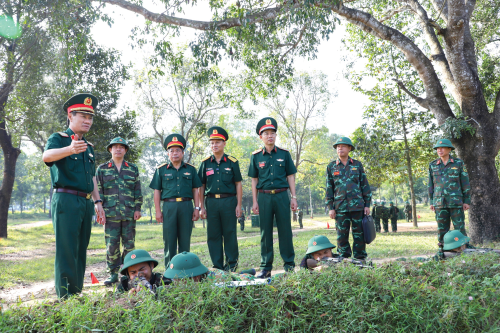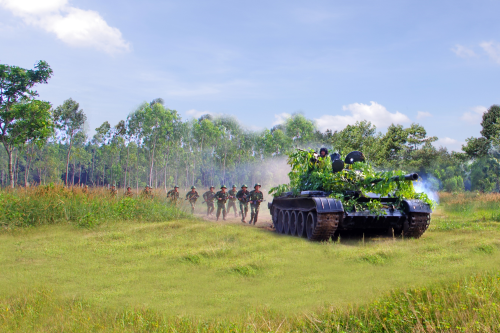Army College No. 2 innovates and improves the quality of education and training
Innovation and improvement of the quality of education and training are major and consistent policies of the Party, the State, the Central Military Commission and the Ministry of National Defence. Thoroughly grasping that spirit, Army College No. 2 focuses on leading and directing the good implementation of this policy, with many synchronous and appropriate solutions, meeting the requirements of building the Army in the new situation.
In recent years, Army College No. 2 has thoroughly grasped and implemented the Party's policy of "fundamental and comprehensive innovation in education and training" and the resolutions and directives of the Central Military Commission and the Ministry of National Defence with many practical measures, in line with the tasks of a training centre of battalion-level army officers, achieving many important results. The training programmes and contents have been reviewed and adjusted in a scientific and increasingly standardised manner, meeting the training goals and requirements of each subject. The methods of teaching and learning have seen many innovations; the application of information technology, simulation technology, and digitalisation has been promoted, making a substantial change in training and scientific research. Inspection, examination, testing and evaluation work are maintained in a serious manner, in accordance with the motto of "practical teaching, practical learning, and practical assessment". In particular, the College has deployed breakthrough measures in building and developing a team of teachers and educational managers. As a result, its education and training has seen all-round development; training quality has been significantly improved. Surveys at some units reveal that 100% of its graduates complete their tasks at initial positions, in which 97.3% complete their responsibilities and tasks well. The reputation and position of the College in the system of Military school and the national education system continue to be affirmed and enhanced.
 |
| Rector of the College checks training work |
Currently, the task of building a “seasoned, compact, strong” Army, moving towards modernity, has set for military academies and schools in general, and Army College No.2 in particular, very demanding goals and requirements in training human resources, especially the high-calibre ones. To meet those goals and requirements, the College has deployed all aspects of work, with many synchronous solutions to continue to innovate and further improve the quality of education and training, focusing on the following ones:
First of all, thoroughly briefing and raising the awareness and responsibility for subjects about the task of education and training innovation. The College’s Party Committee and Board of Directors strengthen their directions of departments, faculties, and cadet units to regularly thoroughly grasp the resolutions and directives of higher echelons on education and training innovation, focusing on Resolution No. 29-NQ/TW, dated 04 November 2013 of the Central Executive Committee (11th tenure) on "Fundamental and comprehensive innovation of education and training, meeting the requirements of industrialisation and modernisation in the conditions of a socialist-oriented market economy and international integration"; Resolution No. 1657-NQ/QUTW, dated 20 December 2022 of the Central Military Commission, Resolution No. 816-NQ/DU, dated 21 March 2023 of the College’s Party Committee on "innovation in education and training to meet the requirements of the task of building a Military School in the new situation". The Party Committee Standing Committee and Board of Directors of the College directly direct its subordinate Party Committees, departments and units to thoroughly grasp and develop plans to implement the Resolution; direct departments and units to coordinate, advice on the development and implementation of programmes and plans; strengthen inspection and experience sharing, especially correcting and overcoming the mindset of satisfaction, formalities, and hesitation to innovation.
Second, strongly innovating the training process, programme, and content in the direction of: modernity, practicality, and efficiency. Based on the identified training goals and requirements, the College continues to promote the implementation of the Project "Innovation of training processes and programmes for officers at all levels in the Army to meet the requirements of tasks in the new situation". In particular, it focuses on reviewing, supplementing, and adjusting the training programmes and contents of the subjects to ensure connectivity and inheritance between levels, grades, and subjects, avoiding dispersion and duplication. In particular, implementing Directive No. 89/CT-BQP, dated 04 April 2018 of the Ministry of National Defence "On strengthening the summary of practical training, combat readiness and combat work associated with the education and training work of military schools, meeting the requirements and tasks in the new situation", the College continues to direct research to include in the training programme and content new issues on military and defence tasks; new developments in military art, military technology, people's war, cyberspace operations, operations to protect sea and island sovereignty and practical training and combat readiness of the unit, ensuring good implementation of the motto "The quality of the school's training is the level of unit's combat readiness". Besides, to achieve the goal of training comprehensive capacity for cadets, the College reviews and refines the training programme in the direction of reducing theoretical volume, increasing practical training, internship at the unit, and self-study of students; combining military knowledge with professional skills, party work skills, political work and knowledge of economics, society, law, foreign languages, information technology and other necessary skills, meeting the requirements of building the Army in the new situation.
 |
| Field training |
Third, promoting innovation in teaching and learning methods towards interactive, learner-based direction. The school applies measures to optimise the teaching and learning process; makes a strong shift from transferring knowledge to a combination between transferring knowledge, training skills and developing thinking methods. Promote the application of information technology, especially simulation and digital technology in teaching to increase the visuality and relevance to the reality of training and combat. Bring into full play the role of lecturers in coordination with managers in guiding, maintaining and controlling self-study activities of cadets. The College requires its faculties and lecturers to research and innovate teaching methods suitable to the contents, programmes and training subjects, resolutely overcome the situation of one-way knowledge transmission; actively apply problem-solving methods in teaching, in order to promote the proactiveness and creativity of learners. For cadets, the College encourages their innovation in learning in the direction of combining knowledge acquisition with self-study, self-research, enhancing exchange, discussion and practice in positions, in order to promote the ability of independent thinking, creativity and the ability to apply knowledge into practice to train their skills, bravery, command manner and their advisory level.
Fourth, building the staff of teachers and educational managers on par with the requirements of innovation in education and training. Implementing the Project "Building the contingent of teachers and educational managers in the Army for the period of 2023 - 2030 and the following years", the College actively selects training sources, fosters, develops, and standardises the team of teachers and educational managers. It selects and sends the qualified cadres for further training at military and civil academies and schools, both at home and abroad, together with conducting on the job training through pedagogical activities of faculties and departments, and sending cadres and lecturers on field trips to study practice at units. Besides, it creates favourable conditions for teachers and educational managers to self-improve their levels, participate in scientific research, and are eligible for scientific titles. It strives that every year, 03 to 05 cadres and lecturers are recognised as associate professors, and over 20% of its cadres finish field trips at units. By 2025, over 75% of its cadres will meet the prescribed standards; 75% will have gone through command and managerial positions; over 60% of its cadres and lecturers will have postgraduate degrees, in which 12% to 15% have doctorate degrees,...so that this staff are in good quality, reasonable structure, meeting task requirements.
Fifth, mobilising resources for investing in and standardising teaching and learning facilities. So far, thanks to the investment of the Ministry of National Defence, the College has built quite a modern system of lecture halls and training grounds, along with many synchronised teaching and learning facilities. However, to meet the requirements of innovation and improve the quality of education and training, the College continues to mobilise resources to consolidate its barrack, renovate and upgrade training grounds, etc. In particular, priorities are given to the modernisation of information technology infrastructure as a foundation for promoting digital transformation and building the "Smart School" model. In addition, the College proactively upgrades and improves the system of training materials and digital library to meet the requirements of teaching, learning and scientific research. At the same time, it will build cultural, artistic, and sports institutions to create a healthy military cultural environment, and promote the improvement of training quality.
With the above solutions, it is believed that Army College No. 2 will create a breakthrough in innovation, improve the quality of education and training, contributing to building high-skill human resources to meet the requirements of Fatherland protection in the new situation.
Major General, Dr. LUONG DINH LANH, Rector of the College